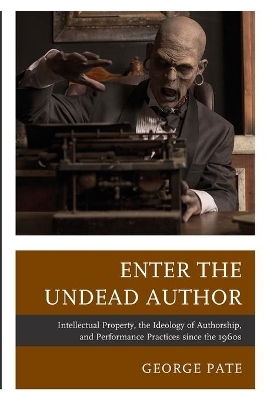
Enter the Undead Author
Intellectual Property, the Ideology of Authorship, and Performance Practices since the 1960s
Seiten
2021
Fairleigh Dickinson University Press (Verlag)
978-1-68393-160-7 (ISBN)
Fairleigh Dickinson University Press (Verlag)
978-1-68393-160-7 (ISBN)
Enter the Undead Author explores the points of tension between the idea of authorship and the realities of theatrical production and other performance practices from the 1960s to the present with special focus on those moments when authorship helps to reappropriate revolutionary practices into traditional modes of production.
Many narratives of theater history suggest that the 1960s marked the start of a turning away from traditional, script-based, playwright-centric production practices. Literary studies in this period began exploring the concept of the “death of the author” along similar lines. But the author refused to die quietly, and authorship reasserts itself in even revolutionary and avant-garde theaters throughout the latter half of the twentieth century. The model of authorship—valorizing individuality, ownership, and originality—serves to maintain traditional modes of production that reproduce and uphold dominant ideologies even when the products created by those modes of production claim to buck tradition or run counter to cultural currents. This ideology of authorship plays a part in playwrights shutting down productions of their own plays, in the privileging of individual authorship over joint authorship even in collaborative genres, and in the insistence on originality even in performance traditions rooted in a shared repertoire. This tension between the theoretical death of the author and the growth of actual authors’ abilities to control access to and even in some cases interpretations of their work exposes the deftness with which dominant ideologies and their attendant modes of production can repurpose the aesthetics of even countercultural or revolutionary movements in theater.
Many narratives of theater history suggest that the 1960s marked the start of a turning away from traditional, script-based, playwright-centric production practices. Literary studies in this period began exploring the concept of the “death of the author” along similar lines. But the author refused to die quietly, and authorship reasserts itself in even revolutionary and avant-garde theaters throughout the latter half of the twentieth century. The model of authorship—valorizing individuality, ownership, and originality—serves to maintain traditional modes of production that reproduce and uphold dominant ideologies even when the products created by those modes of production claim to buck tradition or run counter to cultural currents. This ideology of authorship plays a part in playwrights shutting down productions of their own plays, in the privileging of individual authorship over joint authorship even in collaborative genres, and in the insistence on originality even in performance traditions rooted in a shared repertoire. This tension between the theoretical death of the author and the growth of actual authors’ abilities to control access to and even in some cases interpretations of their work exposes the deftness with which dominant ideologies and their attendant modes of production can repurpose the aesthetics of even countercultural or revolutionary movements in theater.
George Pate is assistant professor of theater and drama in the Department of English, Theater, and Liberal Studies at the University of South Carolina at Beaufort.
Preface
Introduction
Chapter 1. 1984: The Author as Owner
Chapter 2. “A Necessary Myth”: The Author as Individual
Chapter 3. Whose Joke Is It Anyway? The Author as Originator
Conclusion
Bibliography
Index
About the Author
| Erscheinungsdatum | 17.05.2021 |
|---|---|
| Reihe/Serie | The Fairleigh Dickinson University Press Series in Law, Culture, and the Humanities |
| Verlagsort | Cranbury |
| Sprache | englisch |
| Maße | 153 x 220 mm |
| Gewicht | 263 g |
| Themenwelt | Geisteswissenschaften ► Sprach- / Literaturwissenschaft ► Anglistik / Amerikanistik |
| Geisteswissenschaften ► Sprach- / Literaturwissenschaft ► Literaturwissenschaft | |
| Recht / Steuern ► EU / Internationales Recht | |
| Recht / Steuern ► Wirtschaftsrecht ► Urheberrecht | |
| ISBN-10 | 1-68393-160-2 / 1683931602 |
| ISBN-13 | 978-1-68393-160-7 / 9781683931607 |
| Zustand | Neuware |
| Haben Sie eine Frage zum Produkt? |
Mehr entdecken
aus dem Bereich
aus dem Bereich
Poetik eines sozialen Urteils
Buch | Hardcover (2023)
De Gruyter (Verlag)
59,95 €
Buch | Softcover (2024)
belleville (Verlag)
20,00 €


